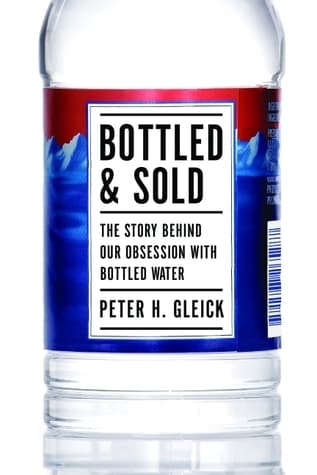
Book Review Summary: Bottled and Sold: The Story Behind Our Obsession with Bottled Water
Introduction
Bottled and Sold: The Story Behind Our Obsession with Bottled Water by Peter H. Gleick is a thought-provoking book that delves into the history, culture, and business of bottled water. Gleick, a renowned scientist and freshwater expert, explores how water went from being a free natural resource to one of the most successful commercial products of the last century. In this article, we will summarize the main points of the book, analyze common opinions, and provide reasons for both recommending and not recommending it.
About Peter H. Gleick
Peter H. Gleick, Ph.D., is a world-renowned scientist and freshwater expert who works at the Pacific Institute in Oakland, California. He has been recognized for his work on global freshwater challenges, including conflicts over water resources, climate change impacts, and the human right to water. Gleick's extensive knowledge and experience in the field make him an ideal author to tackle the topic of bottled water.
Analysis of Views
- The Commercialization of Water: Many readers praise Gleick for shedding light on the commercialization of water. They appreciate his investigation into industry claims about the safety, convenience, and taste of bottled versus tap water. Gleick exposes the true reasons behind our obsession with bottled water, including fearmongering by business interests and our own vanity.
- The Environmental Impact: A common theme among readers is the environmental impact of bottled water production and consumption. They highlight the massive amounts of plastic waste generated by the industry and the carbon footprint associated with shipping bottles across the globe. Many readers express concern about the long-term consequences of relying on bottled water instead of investing in public water systems.
- The Role of Government and Free Markets: Some readers express disappointment with the lack of regulation and oversight in the bottled water industry. They argue that government agencies should play a more significant role in ensuring the safety and quality of tap water, rather than allowing businesses to profit from the sale of bottled water.
- The Human Right to Water: Many readers appreciate Gleick's exploration of the human right to water. They emphasize the importance of ensuring access to safe, affordable, and reliable water and sanitation for all people, regardless of their socioeconomic status. The book raises awareness about the global inequities surrounding water access and underscores the need for collective action to address these issues.
- The Power of Advertising: Readers also discuss the influence of advertising on our perceptions of bottled water. They point out how companies use marketing strategies to promote their products as superior to tap water, often without providing concrete evidence to back up their claims. This manipulation of consumer perception contributes to the continued popularity of bottled water despite its environmental and ethical drawbacks.
Reasons for Recommendation
- Informative and Accessible: Readers recommend Bottled and Sold for its comprehensive coverage of the bottled water industry. The book presents complex information in an accessible manner, making it suitable for both experts and general readers interested in learning more about this topic. Gleick's writing style engages readers and keeps them informed without overwhelming them with technical jargon.
- Raises Awareness: The book effectively raises awareness about the environmental, safety, health, and ethical concerns associated with bottled water. Readers appreciate Gleick's ability to present well-researched arguments and provide evidence to support his claims. This awareness can motivate individuals to reconsider their drinking habits and make more informed choices about their water consumption.
- Balanced Perspective: Many readers appreciate that Gleick presents a balanced perspective on the issue of bottled water. He acknowledges both the benefits and drawbacks of tap water, allowing readers to form their own opinions based on a well-rounded understanding of the topic. This balanced approach contributes to a more nuanced discussion about water consumption and its implications for society.
Reasons for Not Recommendation
- Bias: Some readers express concern about Gleick's bias towards promoting tap water over bottled water. They argue that he presents a one-sided viewpoint without adequately addressing counterarguments or acknowledging the potential benefits of bottled water in certain situations, such as during travel or in areas with poor tap water quality. This perceived bias may influence readers' interpretation of the book's conclusions.
- Lack of Holistic Approach: A few readers feel that the book lacks a holistic approach to addressing the global water crisis. They argue that while it effectively highlights issues related to bottled water, it does not delve deeply into broader environmental, economic, and societal implications associated with privatizing one of our most basic needs. This limited scope may leave some readers seeking a more comprehensive understanding of the topic.
Conclusion
Peter H. Gleick's Bottled and Sold: The Story Behind Our Obsession with Bottled Water offers a comprehensive analysis of the bottled water industry, shedding light on its history, culture, and environmental impact. Through his research and storytelling abilities, Gleick presents a compelling case for reconsidering our reliance on bottled water and advocates for investing in public water systems instead. While some readers appreciate the book's informative nature and balanced perspective, others express concerns about its bias and lack of holistic approach to addressing global water challenges. Overall, Bottled and Sold serves as a thought-provoking read that encourages readers to think critically about their drinking habits and consider alternative solutions for ensuring access to safe and sustainable water resources.